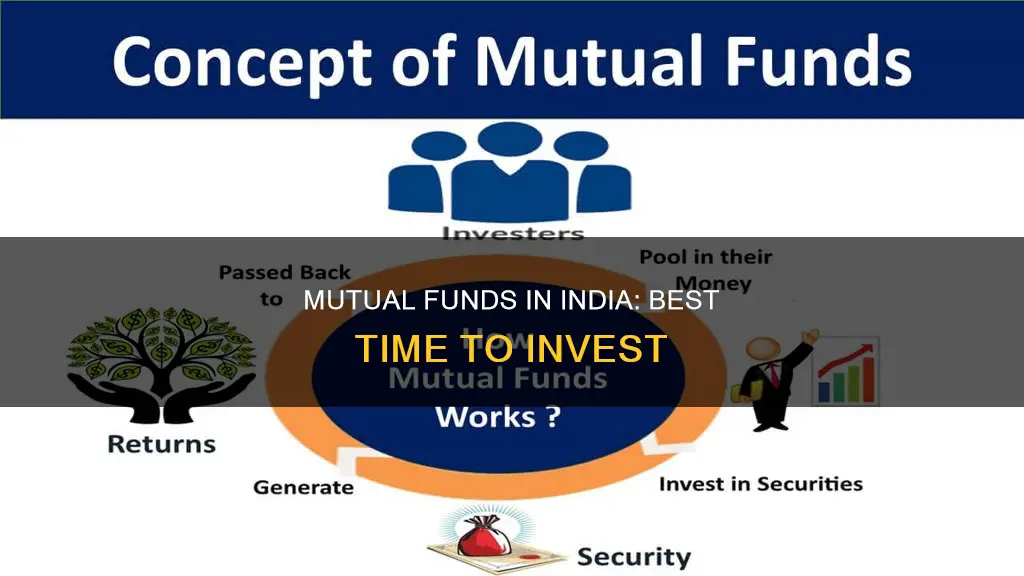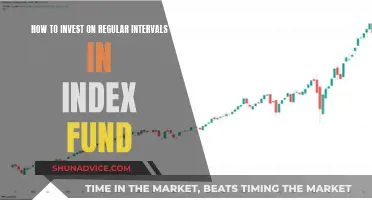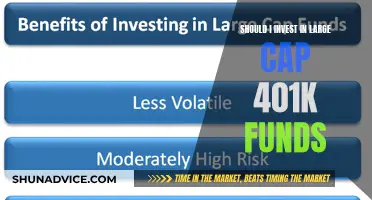
Investing in mutual funds is a popular way to grow your money in India. Mutual funds are a type of investment vehicle where multiple investors pool their money, which is then managed by professionals and invested across various asset classes such as equity, debt, gold, and other securities. The gains and losses are divided among investors in proportion to their investment. Mutual funds offer a smart way to grow your money, providing the potential for higher-than-inflation returns. They are also highly liquid, allowing you to buy and sell them anytime. With a low minimum investment requirement, mutual funds are an excellent option for those looking to diversify their portfolio and achieve their financial goals.
| Characteristics | Values |
|---|---|
| Investment vehicle | Pooling money from multiple investors to invest in a variety of assets |
| Investment types | Equity funds, debt funds, hybrid funds, ELSS (tax saving funds), etc. |
| Management | Professionally managed by fund managers |
| Liquidity | Superior liquidity compared to some other instruments as they can be bought and sold anytime |
| Performance | Historically, mutual fund returns have been higher than other traditional investment options |
| Investment amount | Can start with as low as ₹ 500 |
| Diversification | A small investment amount can provide a diversified portfolio, reducing risk |
| Regulation | Regulated by SEBI to ensure transparent processes and protect investors' interests |
| Investment plan | SIP (Systematic Investment Plan) allows for fixed-sum investments at regular intervals |
| One-time investment | Called a lumpsum investment |
| Costs | Expense ratio, transaction charge, exit load, securities transaction tax, stamp duty, etc. |
| KYC | Know Your Customer compliance is mandatory before investing |
What You'll Learn

Know your investor personality
Knowing your investor personality is essential before investing in mutual funds. Here are some key considerations to help you understand your investor personality:
Risk Tolerance
Understanding your risk tolerance is crucial before investing in mutual funds. Risk tolerance refers to the amount of risk you are comfortable taking with your investments. Different mutual funds cater to various risk profiles, so it is important to choose funds that align with your risk appetite. If you have a high-risk tolerance and are seeking high returns, you may consider investing in equity schemes. On the other hand, if you prefer a more moderate approach with lower risk and stable returns, debt schemes may be more suitable. It is important to remember that higher returns often come with higher risks.
Investment Goals
Defining your investment goals is an essential aspect of knowing your investor personality. Are you investing for the short term or long term? Do you have specific financial objectives, such as saving for retirement, a child's education, or buying a new house? Clearly understanding your investment goals will help you choose the right mutual funds that align with your desired time horizon and financial targets.
Investment Horizon
Your investment horizon refers to the length of time you plan to invest for. This is an important consideration when investing in mutual funds. Different mutual funds may be more suitable for short-term or long-term investment horizons. For example, if you are investing for the long term, you may be willing to take on more risk to achieve higher returns. In contrast, a shorter investment horizon may prompt you to choose more stable and conservative investment options.
Financial Situation
Your current financial situation plays a crucial role in determining your investor personality. How much money do you have available to invest? Can you invest a lump sum, or do you prefer regular investments through Systematic Investment Plans (SIPs)? Considering your financial situation will help you choose mutual funds that fit your budget and investment strategy.
Liquidity
When investing in mutual funds, it is important to consider the liquidity of the specific funds you are interested in. Mutual funds are generally liquid investments, but some funds may have restrictions or penalties for early withdrawals. Understanding the liquidity of the fund will help you make informed decisions about when and how to invest.
Tax Implications
Mutual fund investments have tax implications that you should understand before investing. Different types of mutual funds, such as equity and debt funds, have distinct tax treatments. Consult a tax professional to understand the tax consequences of your mutual fund investments and make informed decisions about which funds to choose.
In conclusion, knowing your investor personality involves understanding your risk tolerance, investment goals, time horizon, financial situation, and the tax implications of your investments. By considering these factors, you can make informed decisions about investing in mutual funds that align with your financial objectives and risk appetite.
Closed-End Funds: When to Invest for Maximum Returns
You may want to see also

Understand the costs of investing in mutual funds
All investments carry costs, and these costs reduce any returns you might get on your investments. Mutual funds—one of the most common investment instruments—charge what’s called an expense ratio. This is a measure of what it costs to manage the fund expressed as a percentage. It is based on the total assets invested in the fund and is calculated annually. This fee is typically paid out of fund assets, so you won’t be billed for it, but it will come out of your returns.
For example, if the mutual fund returns 8% and the expense ratio is 1.5%, you’ve only earned 6.5% on your shares. A higher expense ratio means a higher portion of your money is going to the management team instead of to you. It also means the fund has to perform better to earn back what’s been deducted.
- Management expense ratio (MER): The MER is the fee charged to manage the money invested in a mutual fund. It includes the fund’s management fee, operating expenses, and taxes during a given year.
- Trading expense ratio (TER): The TER represents the amount of trading commissions incurred when the portfolio management team buys and sells equities (stocks) within a given fund.
- Sales charges: A load is a sales charge that an investor may incur when buying or redeeming units or shares in a mutual fund. There are two types of sales charge structures: no load, and front-end load or initial sales charge. No-load funds do not incur sales charges when purchased or redeemed, while a front-end load is a sales charge paid upon purchase, ranging from 0% to 5% of the amount invested.
- Account fees: These may be charged for maintaining smaller accounts with balances below a set minimum.
- Exchange fees: A fund might charge an exchange fee if you exchange one fund for another within the same fund family.
- Loads: These sales commissions can be charged when you buy (front-end load) or sell (back-end load) your stake.
- Purchase fees: Like front-end loads, purchase fees are paid when buying shares but are not considered a broker commission or counted as part of the load.
- Redemption fees: Some mutual funds charge a redemption fee when you sell your shares within a short period (usually 30 to 180 days), which is designed to discourage short-term trading in these funds for stability.
- Trading costs: The fund accumulates these when buying and selling securities for its portfolio. While they aren't charged to investors, they affect the fund's overall performance.
- Annual and custodian fees: Annual fees are often low, about $25 to $90 a year. Custodian fees usually apply to retirement accounts (e.g., IRAs) and cover costs associated with fulfilling IRS reporting regulations, ranging from $10 to $50 per year.
- Commissions: Commissions are fees paid to the broker for their services.
Vanguard Funds: Best Investment Options for Your Portfolio
You may want to see also

Learn how to withdraw your money
There are several methods to redeem your cash from a Mutual Fund plan. These include:
- Using a Broker or Distributor: If you invested through a broker or distributor, you can withdraw money from a Mutual Fund plan through them. You can contact your broker and request a withdrawal, or complete and submit a withdrawal request form offline. Alternatively, if your broker provides an online service, you can redeem your investment by logging into your Mutual Fund account and making a withdrawal request.
- Using your Trading and DEMAT Accounts: If you use your DEMAT and Trading Accounts to invest in Mutual Fund schemes, you can withdraw money from these accounts. First, enter your account, choose the amount you want to withdraw, and submit your request to verify your Mutual Fund investment. Once the bid has been verified, the redemption will be performed, and the money will be transferred to your connected bank account.
- Using the Asset Management Company (AMC): You can redeem your Mutual Fund plan directly with the AMC, either in person at an AMC branch office or online. You can also visit the AMC's official website or download its mobile app to easily find redemption information.
- Using the Registrar and Transfer Agent: The Registrar and Transfer Agent can help you invest in and withdraw from Mutual Fund schemes. You can initiate your withdrawal by making a request to the Registrar and Transfer Agents locally or online.
You may also redeem your Mutual Funds online by going to the Mutual Fund's official website. If you purchased a Mutual Fund through a third-party Mutual Fund website, you can save your investment information there. On the website, you will need to select the “Online Transactions” option, log in with your Folio Number and Permanent Account Number, pick your Plan and the Number of Units you wish to redeem, and confirm your transaction.
It's important to keep in mind that there are a few crucial considerations when submitting a redemption request. These include:
- Type of Fund: The type of fund you have invested in will determine whether you can redeem your funds at a given point in time. For example, close-ended funds such as ELSS or fixed-maturity funds can only be redeemed after their lock-in period ends.
- Exit Load: Open-ended funds do not have a lock-in period, but if the funds are redeemed within a specified period, they may attract an exit load. For example, if a fund is redeemed within 1 year from the date of purchase, an exit load of 1% (variable) may be charged. It's important to note that the amount of exit load varies as it is not a statutory charge, and the period and percentage of load are scheme-specific.
- Payout Time: Typically, it takes 2-4 business days for the payout to be credited to the beneficiary account. Therefore, it is advisable to plan ahead if the funds are required for a specific purpose.
- Tax Implications: If equity-based mutual funds are held for more than a year, they are not taxable for the investor. However, if they are redeemed after 1 year, the gains will attract a long-term capital gains tax of 10%, along with a surcharge and education cess if the capital gains exceed Rs. 1 lakh. On the other hand, if the same fund is invested in non-equity-based mutual funds, it will be taxable at the rate of 20% with indexation if held for less than 3 years.
Remember, while mutual fund investments offer flexibility in terms of redemptions, it is always recommended to consult official sources and financial advisors for the most accurate and up-to-date information regarding your specific investment.
Index Funds: How Much Should You Invest?
You may want to see also

Know the difference between mutual funds and exchange-traded funds (ETFs)
Mutual funds and exchange-traded funds (ETFs) are two popular investment options in India. While both offer a way to diversify one's portfolio, there are some key differences between the two.
How Mutual Funds Work
Mutual funds are investment vehicles where multiple investors pool their money. This pooled money is then invested by a fund manager across various asset classes, including equity, debt, gold, and other securities. The gains and losses incurred are divided among investors based on their proportion of the investment.
Mutual funds are typically actively managed, meaning fund managers make decisions about how to allocate assets to beat the market and maximise returns for investors. This active management comes at a higher cost, with mutual funds usually requiring minimum investments of hundreds or thousands of dollars.
Mutual funds can only be purchased at the end of each trading day, based on the calculated price known as the net asset value (NAV). This price is determined after the market closes, reflecting changes in the portfolio value.
How ETFs Work
ETFs, on the other hand, are traded intra-day like stocks. They can be bought and sold on the open market with other investors throughout the trading day, making them a better choice for active traders. ETFs are usually passively managed, tracking a market index or sector sub-index.
ETFs are often cheaper to invest in, as there is no minimum investment requirement. You can invest in an ETF if you can afford a single share. They are also generally more tax-efficient than mutual funds, as they are less likely to trigger capital gains tax liabilities for shareholders.
Key Differences
| Mutual Funds | Exchange-Traded Funds (ETFs) |
|---|---|
| Actively managed | Passively managed |
| Higher minimum investment | No minimum investment requirement |
| Purchased at the end of each trading day | Traded intra-day like stocks |
| Potentially less tax-efficient | More tax-efficient |
Best Vanguard Funds for Your Taxable Investment Portfolio
You may want to see also

Understand the tax implications of investing in mutual funds
When investing in mutual funds, it is important to understand the tax implications to ensure you are properly reporting your income and paying the correct amount of tax. In general, most distributions received from a mutual fund must be declared as investment income on your yearly taxes. However, there are several factors that determine how much income tax you will pay on each dollar of a distribution. These include the type of distribution received, the duration of the investment holding, and the type of investment.
In some cases, distributions are taxed at your ordinary income tax rate, which is the highest rate. In other cases, you may be eligible to pay the lower capital gains tax rate. Other distributions may be completely tax-free.
When it comes to distributions, the difference between ordinary income and capital gains is based on how long the fund has held an individual investment within its portfolio. If you receive a distribution from a fund that results from the sale of a security the fund held for less than a year, that distribution is taxed as ordinary income. If the fund held the security for 12 months or more, those funds are subject to the capital gains tax instead.
The difference between your ordinary income tax rate and your corresponding long-term capital gains tax rate can be significant. For example, in 2022, those in the 10% and 12% income tax brackets were not required to pay any income tax on long-term capital gains. On the other hand, individuals in the 37% tax bracket who exceeded the maximum were subject to a 20% capital gains tax.
It is also important to note that if you sell your shares in a mutual fund, any amount that is a return on your original investment is not taxable since you already paid income taxes on those dollars when you earned them.
In addition to distributions from the sale of assets, mutual funds also make dividend distributions when underlying assets pay earnings or interest. Mutual funds are pass-through investments, which means any income they receive must be distributed to shareholders. In general, dividend income is taxed as ordinary income. However, there are two important exceptions: qualified dividends and tax-free interest.
Dividend distributions received from your mutual fund may be subject to the capital gains tax rate if they are considered qualified dividends by the IRS. To be qualified, the dividend must be paid by a stock issued by a US or qualified foreign corporation, and the mutual fund must have held the stock for more than 60 days within the 121-day period beginning 60 days before the ex-dividend date.
The other way to minimize your income tax bill is to invest in so-called tax-free mutual funds, which invest in government and municipal bonds that pay tax-free interest. However, while municipal bonds are exempt from federal income tax, they may still be subject to state or local income taxes.
Calculating the taxes owed on mutual fund income and distributions can be complex, and it is recommended to consult a tax professional to ensure you are properly reporting all your investment income.
Crowdfunding: Investing for All, Without Barriers
You may want to see also







